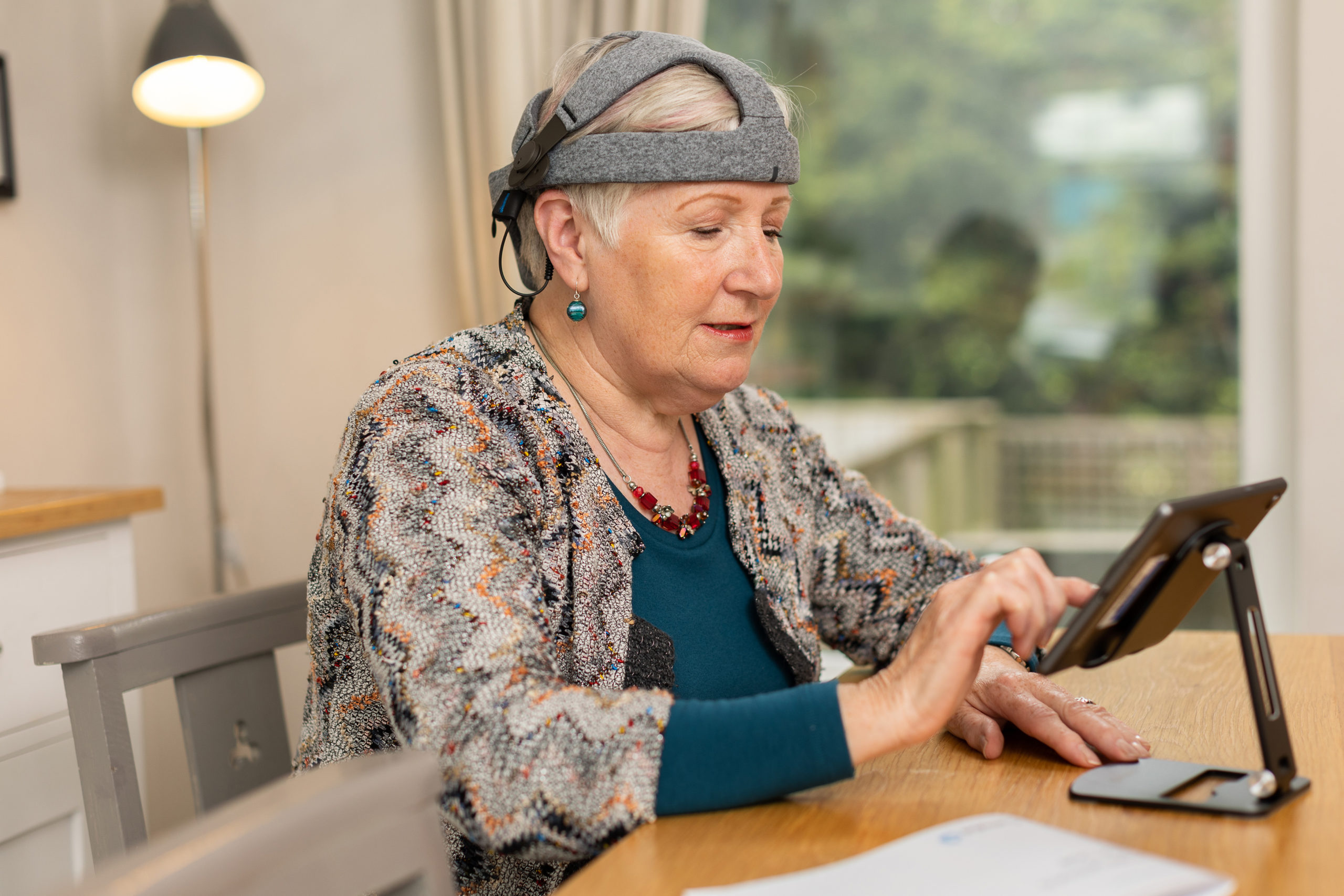Making it easier to capture real-world data in neuroscience studies
Cumulus Neuroscience is reshaping the landscape of clinical trials. This Belfast-based health tech company is making it possible to capture valuable cognitive and behavioural data from patients taking part in clinical studies, all from the comfort of their home. The digital biomarkers emerging from these studies have the potential to transform the pace at which new treatments for neurodegenerative and neuropsychiatric conditions are discovered.
Cumulus has developed a platform that allows patients to engage in tablet-based neurological assessments while wearing a wireless electroencephalogram, or EEG, headset. The platform has the ability to capture data across multiple domains of brain function including cognition, mood, memory and language in real-time. This game-changing data will help researchers better understand mechanisms of disease, drug effect, drug target engagement and dosing.

Challenge
The breakthrough technology was born out of a global challenge facing the biopharmaceutical industry: why were so many of the drugs being developed for dementia failing? In 2019, a panel of like-minded R&D experts was convened by Dr Ruth McKernan, a retired pharmaceutical R&D executive and Venture Partner at SV Health Investors who co-founded the Dementia Discovery Fund (DDF). Together, they discussed the major challenges associated with drug development including: how paper-and-pen-based cognitive assessments have limitations and can be influenced by clinician bias; how there was the lack of biomarkers and overlapping symptoms across diseases; and how day-to-day variations in brain function and data noise can compromise accurate measurement. They agreed the solution must allow for frequent measures across multiple domains of brain function, and be combined with objective, real-world brain wave data, all while minimising the burden on patients taking part in clinical studies.
Solution
After an extensive due diligence process that included assessing the capabilities of 30 companies, the DDF decided to invest in BrainWaveBank in 2020. This company was selected based on its strong capabilities, including a dry sensor EEG headset that could be used at home, a platform that was software and hardware agnostic, and a set of high-engagement digital tasks to assess memory and executive function.
BrainWaveBank was rebranded as Cumulus Neuroscience and went on to be awarded over £4 million of grant funding from Innovate UK’s Biomedical Catalyst (BMC) and the National Institute for Health and Care Research (NIHR) to develop a next-generation portable EEG headset. Paired with its AI-enabled multi-domain digital biomarker platform, Cumulus has been able to support better, faster decision-making in neurology and neuropsychiatry clinical trials and patient care.
We now have a solution that will dramatically reduce the cost and time it takes to carry out clinical trials. Patients can take part from home, the data is more frequent and relevant, and still with an accuracy that ensures consistency across studies. Ultimately, it will accelerate the development of treatments and bring hope to millions of patients and families.
– Dr Brian Murphy, founder and Chief Scientific Officer of Cumulus
The BMC funding supported a study to measure the validity of using at-home, remote technology amongst a younger and older population. Over four to six weeks, participants were asked to complete a series of assessments using the Cumulus Neuroassessment Platform. It showed high adherence rates of over 94% overall, with an average 93% of older adults and 96% of younger adults successfully completing the required tasks. Data from the study also showed how the platform outperformed traditional lab-based assessments. The study went on to be published in Frontiers in Digital Health.
This data adds to the growing evidence for frequent at-home EEG monitoring as an effective way to track the progression of dementia.
– Dr Florentine M Barbey, co-author of the study and Research Scientist at Cumulus Neuroscience
Impact
Ongoing trials continue to support these findings. Chris is a patient currently taking part in a Cumulus-sponsored study who wants to use his experience with Alzheimer’s to help others. He says, “It’s not just about whether you’ve got Alzheimer’s, or you haven’t. There are just so many different impacts on people. With me its memory and speech. With others they get totally lost. But there are so many variances and everyone’s different.” His partner, Julia, takes part in the study as a control patient and says, “What keeps you going with it is that you know it’s going to help people in the future”.
For Cumulus, the Innovate UK grants have been a vital springboard to growth. They helped the company secure over £9 million of investment in a funding round led by the DDF and included LifeArc and the UK Futures Fund. They were also instrumental in enabling Food and Drug Administration market clearance of the Cumulus dry sensor EEG headset which has already received the UKCA mark in the UK. The company has since opened new offices in the Cambridge Innovation Centre in Boston, USA to broaden its partnerships with biopharma innovators and expand into international markets.
Related programme

Biomedical Catalyst
Helps transform innovative ideas into commercially viable businesses.

